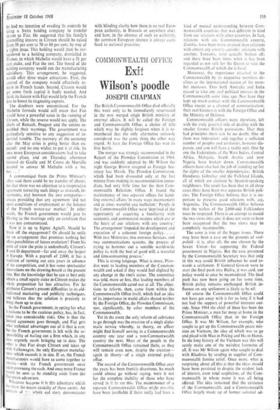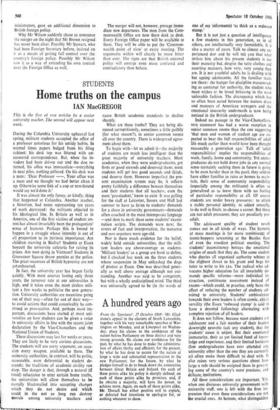Exit Wilson's poodle
COMMONWEALTH OFFICE JOSEPH CHAPMAN
The British Commonwealth Office died officially this week only to be immediately resurrected in the new merged single British ministry of external affairs. It will be called the Foreign and Commonwealth Office, a choice of title which may be slightly forgiven when it is re- membered that the only alternative seriously considered was the same thing the other way round. At least the Foreign Office has won its first battle.
The merger was strongly recommended in the Report of the Plowden Commission in 1964, and was suddenly adopted by Mr Wilson the night George Brown resigned as Foreign Sec- retary last March. The Plowden Commission, which had been dissuaded only at the last minute from making its recommendation imme- diate, had very little time for the then Com- monwealth Relations Office. It found the maintenance of two separate offices for hand- ling external affairs 'in many ways inconvenient and at times wasteful and inefficient.' People in the Commonwealth Office were 'deprived of the opportunity of acquiring a familiarity with economic and commercial matters which are at the heart of our relations with any country.' The arrangement 'impeded the development and execution of a coherent foreign policy. . . . With two Ministries, two overseas Services, and two communications systems, the process of trying to hammer out a sensible world-wide policy is, with the best of good will, a wasteful and time-consuming process.'
This is strong language. What is more, Plow- den went to leading members of the Common- wealth and asked if they would feel slighted by any change in the can's status. The committee was told, more or less, that leading members of the Commonwealth cared not at all. The objec- tions to reform, then, came from within the Commonwealth Office itself, which had an idea of its importance in world affairs shared neither by the Foreign Office, the Plowden Commission, nor, significantly, by other members of the Commonwealth.
Yet in the event the only reform of substance to go through was the creation of a single diplo- matic service whereby, in theory, an officer might find himself serving in a Commonwealth country one year and a non-Commonwealth country the next. Most of the people in the Commonwealth Office remained there, as they will remain even now, despite the creation— again in theory—of a single external policy office.
The record of the Commonwealth Office over the years has been frankly disastrous. So much could almost go without saying, were it not for the complete inability of those who have served in it to see this. The maintenance of a separate Commonwealth Office might possibly, have been justifiable if there really had been a
kind of mutual understanding between Com- monwealth countries that was different in kind from our relations with other countries. In fact, relations with one Commonwealth country, Zambia, have been more strained than relations with almost any country outside: relations with another, Tanzania, were actually broken off; and there have been times when it has been regarded as not safe for the Queen to visit the Commonwealth of which she is head.
Moreover, the importance attached to the Commonwealth by its respective members de- clines as the international stature of the mem- ber increases. Thus both Australia and India ceased to take any real political interest in the Commonwealth some time ago. Nor have they kept up much contact with the Commonwealth Office except as a channel of communication; their real business is with the Foreign Office and the Ministry of Defence.
Commonwealth officers were, therefore, left with the truly paternal role of dealing with the smaller former British possessions. That they had principles there can be no doubt. One of them was federation: add together a sufficient number of peoples and territories, however dis- parate, and you will have a viable unit. One by one the Federations of the West Indies, Central Africa, Malaysia, South Arabia and now Nigeria have broken down. Commonwealth officers have also had the job of standing up for the rights of the smaller dependencies: British Honduras, Gibraltar and the Falkland Islands, all of which are claimed by Spanish-speaking neighbours. The result has been that in all three cases there have been two separate British poli- cies. The Foreign Office believes that it is im- portant to preserve good relations with, say, Argentina. The Commonwealth Office believes that the wishes of the 2,000-odd Falklanders must be respected. There is an attempt to mould the two views into one; it does not seem to have been recognised that the two views may be completely incompatible.
The same is true of the bigger issues. There may have been a case on the grounds of real- poliiik—it is, after all, the one chosen by the Soviet Union—for supporting the Federal government in Nigeria. But the case presented by the Commonwealth Secretary was that only in this way could British influence be used to- wards a settlement. If General Gowon were to start the final push into Biafra, it was said, our policy would at once be reconsidered. The final push has now been going on for some time. British policy remains unchanged. British in- fluence on any settlement is likely to be nil.
Of course the Commonwealth Office could not have got away with it for so long if it had not had the support of powerful interests out- side. Since 1964 the chief of these has been the Prime Minister, a man far more at home in the Commonwealth Office than in the Foreign Office. It was Mr Wilson, for example, who sought to get up the Commonwealth peace mis- sion on Vietnam, the idea of which was to go and plead with Mao in Peking and Ho in Hanoi. In the long history of the Vietnam war this will surely make one of the weirdest footnotes of all. It was Mr Wilson again who sought to deal with Rhodesia by sending in supplies of Com- monwealth famine relief. Once more, what is surprising about all this is that the ideas should have been persisted in despite the evident lack of interest, even total scepticism, of the Com- monwealth in whose name it was all being offered. The idea remained that the existence of the Commonwealth, and a Commonwealth Office largely made up of former colonial ad- ministrators, gave an additional dimension to British foreign policy.
Why Mr Wilson suddenly chose to announce the merger on the night that Mr Brown resigned has never been clear. Possibly Mr Stewart, who had been Foreign Secretary before, insisted on it as a means of getting full control over the country's foreign policy. Possibly Mr Wilson saw it as a way of extending his own control over the Foreign Office as well.
The merger will not, however, presage imme- diate new departures. The men from the Com- monwealth Office are now there desk to desk. Every Foreign Office paper will be available to them. They will be able to put the 'Common- wealth point of view' at every meeting. The arguments within will clearly be more bitter than ever. The signs are that British external policy- will emerge even more confused and contradictory than before.







































 Previous page
Previous page